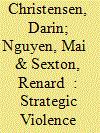|
|
|
Sort Order |
|
|
|
Items / Page
|
|
|
|
|
|
|
| Srl | Item |
| 1 |
ID:
149676


|
|
|
|
|
| Summary/Abstract |
Findings in political science, economics, and security studies suggest that during civil war aid can be used to help establish control of contested areas and reduce insurgent violence by winning the “hearts and minds” of the population. These accounts typically ignore the strategic implications of aid distribution by progovernment forces, namely that rebel groups should resist the implementation of aid projects that would undermine their position. Using a new dataset of fine-grained and geolocated violence incidents in Afghanistan and random variation in the administration of some U.S. counterinsurgency aid, I show that insurgents strategically respond to counterinsurgency aid in contested districts by resisting through violent means. The results indicate that civilian aid only reduces insurgent violence when distributed in districts already controlled by progovernment forces; when allocated to contested districts civilian aid in fact causes a significant increase in insurgent violence. The results also indicate that the effect of counterinsurgency aid on violence varies by project type, and can be overwhelmed by macrolevel strategic changes in the conflict.
|
|
|
|
|
|
|
|
|
|
|
|
|
|
|
|
| 2 |
ID:
165601


|
|
|
|
|
| Summary/Abstract |
Democratic transitions are often followed by conflict. This article explores one explanation: the military’s strategic use of violence to retain control of economically valuable regions. The authors uncover this dynamic in Myanmar, a country transitioning from four decades of military rule. Fearing that the new civilian government will assert authority over jade mining, the military initiated violence in mining townships. Using geocoded data on conflict and jade mines, the authors find evidence for this strategic use of violence. As Myanmar started to transition in 2011, conflicts instigated by the military in jademining areas sharply rose. The article also addresses alternative explanations, including a shift in the military’s strategy, colocation of mines and military headquarters, commodity prices, opposition to a controversial dam, and trends specific to Kachin State. With implications beyond Myanmar, the authors argue that outgoing generals can use instability to retain rents where plausible challengers to state authority provide a pretense for violence.
|
|
|
|
|
|
|
|
|
|
|
|
|
|
|
|
| 3 |
ID:
172336


|
|
|
|
|
| Summary/Abstract |
Natural resource extraction is economically important in many developing countries, but social conflict can threaten the viability of the sector. This article examines why polluting extractive industries sometimes generate social mobilization but often do not. First, I distinguish acute, highly visible environmental externalities from chronic, less observable pollution, showing that only the former generate social mobilization. Second, I explore how high-quality local governance can mitigate the local resource curse dynamic by both reducing pollution and improving compensation in mining-intensive areas. The analysis uses microlevel data on extractive commodities, water pollution, children’s and livestock health, local government quality, and mining-related social conflict in Peru to demonstrate the full causal pathway of the local resource curse.
|
|
|
|
|
|
|
|
|
|
|
|
|
|
|
|
|
|
|
|
|